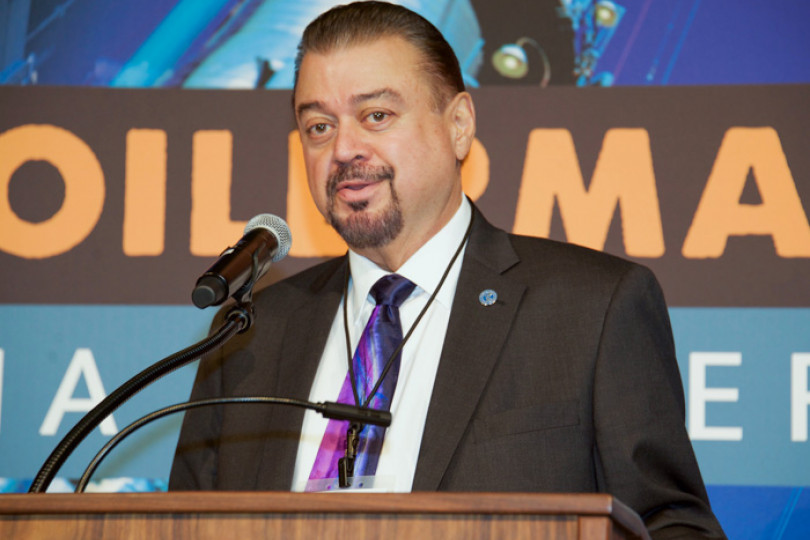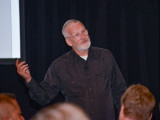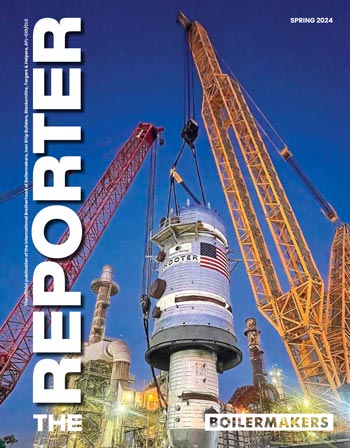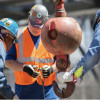“We want to work with our owners — and with our contractors — to make sure we’re getting the right people to man their jobs properly. We want to make sure everyone has the right plan, the right tools and safe projects to put us to work.”
—International Vice President-Western States J. Tom Baca
BUILDING ON DISCUSSIONS begun during the first-ever California Refinery Tripartite conference in 2018, more than 125 refiners, contractors and Boilermakers convened 26 in Napa for the 2019 California Refinery Tripartite meeting.
“Everything here is about what our owners need, so we’re here for your feedback,” International Vice President-Western States J. Tom Baca told attendees. “We want to work with our owners—and with our contractors—to make sure we’re getting the right people to man their jobs properly. We want to make sure everyone has the right plan, the right tools and safe projects to put us to work.
“We’ll take care of the rest—because the Boilermaker expectation is that we show up on time every time ready to work, to get the job done and to take pride in our work.”
The full-day tripartite meeting focused on three key areas: manpower, skillsets and safety. Addressing the issue of manpower and skillsets, International Vice President-Southeast Warren Fairley gave a brief update on the M.O.R.E. Work Investment Fund, which was piloted in the Western States.
“The M.O.R.E. Work Investment Fund promises to become a powerhouse of advanced opportunities,” he said. “This initiative has already been good for the Boilermakers’ work opportunities. It’s good for our contractors, and it’s good for our owners. It’s focusing us as Boilermakers on critical areas of recruiting and training. It’s good for you—contractors and owners—because it’s giving you access to more Boilermakers who are safe and highly trained, which will result in higher quality work. It’s giving us an even greater ability to properly man your work.”
Dr. Peter Philips, Professor and Chair of Economics at the University of Utah, who has studied the construction industry for more than 40 years, detailed the ebb and flow of manpower demand in construction relative to job relevance and the economy. He pointed to the Boilermakers’ ability to bring in qualified members from other areas to fill manpower needs as a unique benefit and solution. “What the Boilermakers union does is seek to mitigate the problem of a constant contradiction between the number of Boilermakers they have and the number of Boilermakers you need by integrating the Boilermaker labor market across the entire United States and Canada,” he explained. “It mitigates the problem by moving people around to balance the peaks and troughs in different areas. You’ve come close to solving a Gordian knot problem in the American labor market: how you allocate and preserve highly skilled and safe workers across the vast expanse of North American in ways that work for your members, your signatories and your customers.”
Homing in on the issue of safety, Larry Jansen, ARB vice president and contractor chairman for the Western States Tripartite Alliance, outlined “actual potential severity,” as a strategy for incident root-cause analysis. He credited Exxon Mobile with sharing the strategy, which he likened to “mining the diamond” to examine incidents and determine, based on the severity of the incident, how much time and finances will be invested in preventive measures.
“It’s looking at your resources and using them in the best place possible,” he said, after showing an analysis matrix, sharing a surveillance video of an incident involving a fall from a pick-up truck and then walking through how the analysis is applied to the incident.
“The owners, ultimately, are driving safety,” Jansen said. “And the owners in oil and gas and petrochemical, the refineries, have historically done more about safety than anybody else. They’re sharing what they know, and we’re grateful. They’re driving safety, because that’s a corporate initiative. It’s required by the contractors, and at the end of the day, it’s up to us to make sure everyone goes home safely.”
Of course, climate change and the future of fossil fuels was also top of mind for all Refinery Tripartite participants. Special guest speaker Alex Epstein, founder of the Center for Industrial Progress, offered his insight through his presentation of “The Moral Argument for Fossil Fuels.” The crux of his remarks was that the positive impacts of using fossil fuels far outweigh the negative impacts. As an example, he noted the wrong thinking in the ramp-up of unreliable renewables. He pointed to renewables’ reliance on expensive infrastructure and non-renewable “back up” sources as inefficient and wasteful.
“If we were really concerned about CO2, we would be focused on building more nuclear. But what are we doing in California? We’re shutting down very affordable nuclear plants,” he said. “The green movement is not about improving human life by lowering CO2. It’s about opposing every effective industry.
“Energy and industry make our environment better. Energy and industry aren’t the thorns of our environment, they’re necessary for a good environment.”
He also posited that trades can play a leading role in positioning fossil fuels in a positive light.
“Those in the [fossil fuel] industry need to have pride and to believe they are producing something good and demand justice [rather than being vilified]. The trades historically are actually very good at PR. And one reason they’re good at it is because they have a very strong belief that they’re producing a good product in a good way and should be treated fairly. What would be really powerful is if the trades could take that general confidence and apply it to fossil fuels.”
Other conference discussions centered on recent political advocacy in California through the State Building and Construction Trades Council of California, quality control and state and federal apprenticeship programs.
With the success of two annual California Refinery Tripartite conferences and growth in the Boilermakers role in the industry, IVP Baca said plans are for the event to continue, alternating locations in Northern and Southern California.
“We must continue to listen to each other so we can all work together to ensure we have the safest, most highly-skilled workforce and that we’re cooperating at the highest levels,” added IVP Fairley. “Boilermakers want to continue to do for you what we do best. And that’s to step up when others step back; complete the jobs others are afraid to begin; solve the hardest problems; and get the job done right—safely, on time, within budget—every time.”










